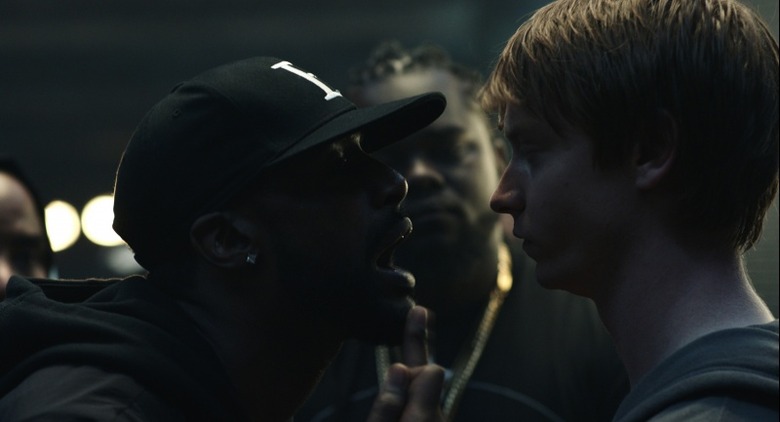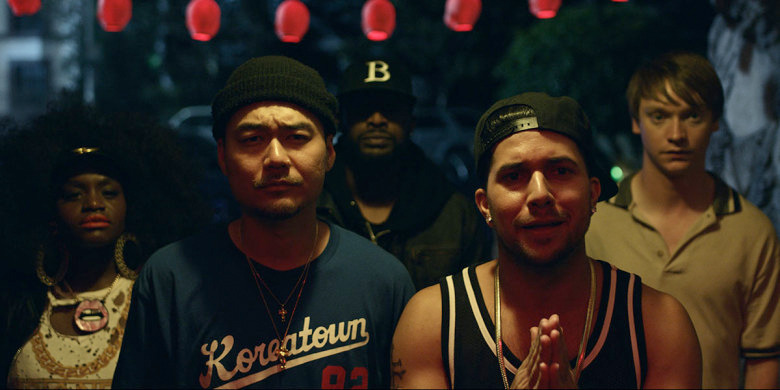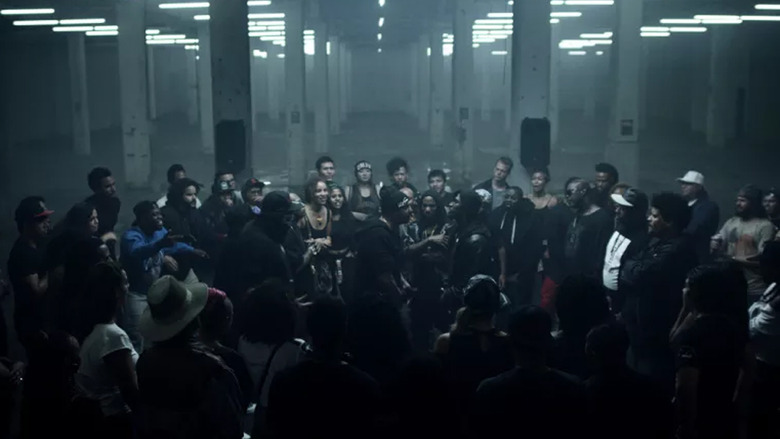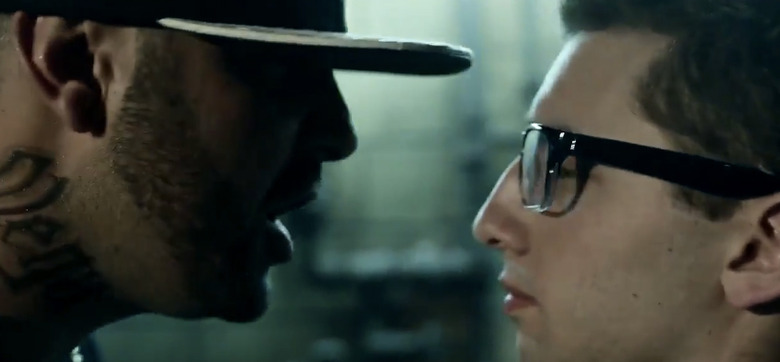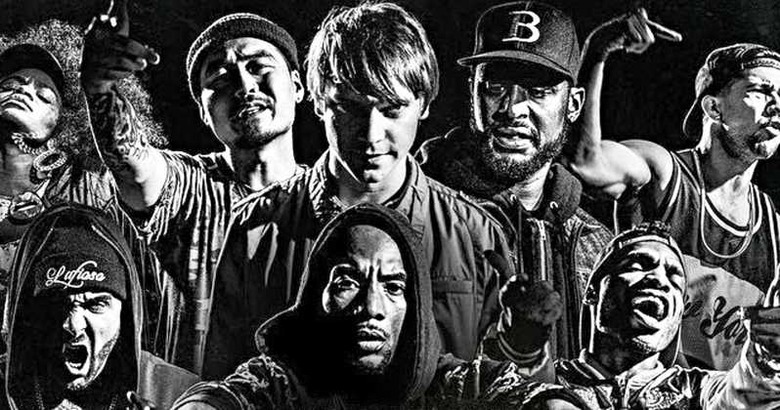Grappling With 'Bodied', 2018's Most Brazen, Entertaining, And Troubling Movie
Joseph Kahn's Bodied, which made its way around the festival circuit last fall, is finally here, though it enters a world that feels even more volatile than the one it was meant to critique. Born out of the polarized reactions to Kahn's "Wildest Dreams" music video for Taylor Swift — which came under fire for centering whiteness in the Serengeti on a fictional '50s film set — the adrenaline-fueled satire follows white academic Adam Merkin (Callum Worthy, American Vandal) as he enters (and eventually, dominates) the world of underground rap battles. It's a wildly entertaining movie, one that draws laughs and gasps and applause in equal measure, and it's best watched with an audience with whom one can experience its thrills and debate their appropriateness after.
"Words. Are. Weapons," a phrase spoken early on in the film's first teaser, may as well be its mantra. It understands the power and the beauty of words, but it also understands their ugliness, and how these categories can shift and overlap depending on context. Its spoken dialogue is as poetic as its battle verses, and its visual palette is just as energetic (both feature Dostoevsky references, too!) though in an era where ugly words can galvanize entire hate movements into action, one wonders just how much fun can be had while exploring their power in a satirical setting. For my money, it's worth the time, but as the film goes on to explore: we are all, each and every one of us, going to have a different approach to art.
A Year in the Life of Bodied
The film's premise alone, the ascension of a white artist in a traditionally Black space (in a film produced by Eminem and written by white Canadian rapper Kid Twist) feels like an open-ended question, one that might instinctually rub you the wrong way depending on who you are, but it might also compel you to look into its context just a little bit further. That is, in essence, what the film is about in the first place. It introduces us to a world of characters built equally of stereotypes, anti-stereotypes and lived experiences, placing them all within an artistic space that demands they be taken to task — both for their art, and by the art of others. Both by the audience, and by their peers. Both for ignoring context, and for being so presumptuous as to establish it in the first place.
By Kahn's own account, the reactions to his "Wildest Dreams" video varied from valid critiques of how we view cinema history as it pertains to race, to more ludicrous accusations that he supports Apartheid. "The conversation," as one might call it — on appropriation, on political correctness, or simply on the role of art in a frayed political climate — is fractured in our online era, veering off in innumerable directions lest a new issue arise and the opportunity for immediate critique be lost. The turnaround time rarely allows for thoughtful consideration, and chances are, the discourse around Bodied may fall victim to the more accelerated part of online culture too.
Or, it may not.
In fact, we may not have the time or the emotional energy to talk about it at all, given everything that's happened these last few weeks. From the rise of fascism in Brazil, to at least three different perpetrators of domestic terror in America, to the Trump administration taking its first steps to ending birthright citizenship and suppressing trans identity, it would appear a desire to inject nuance into conversation around identity politics or "political correctness" (rather than rejecting the idea that they ought to be debated) no longer feels as appropriate as it did last September, when I watched and reviewed the film.
"Political correctness" can, after all, be a synonym for respecting someone's basic humanity. As much as Megyn Kelly might like you to think, avoiding blackface isn't ruining your Halloween. The film however, asks when it might be acceptable to hurl politically-charged insults about one's identity (or make politically charged art in which offense is a byproduct) in the very same vein of those who seek to dehumanize. Adam's self-awareness as a rapper and his clearly put-on bravado become part and parcel of his rapper persona, but despite his "ironic" approach to bigotry, the question remains: when is it okay to cross the lines drawn by polite society?
While the conclusion the film comes to is along the lines of "when both parties deem it acceptable" (before introducing complications to that same answer as the circle of participants widens) the film strikes a nerve that was already raw in 2017, one that only grows more so. Must we, at this point in our history, have this specific debate about when it might be okay to dehumanize someone based on race or gender? As excited as I've been for the film's public release, I wouldn't hold it against anyone if they decided now wasn't the time to engage with it, despite it being one of the most raucous and entertaining audience experiences I've ever seen. (If it sounds like your cup of tea, do watch it with a crowd). And yet, engage with it we must if we choose to watch it, given that it demands we do battle with the cultural context of offensive art in the first place. As much as we might want to hit pause on this conversation, we're still constantly producing and consuming political art, perhaps even quicker than before.
An American Vandal
I love Adam Merkin. I love the sleaziness with which Callum Worthy portrays him, and how he hides behind a puppy-dog stare until it's time to bite. As a character, Adam is an honest embodiment of an occasionally dishonest perspective, a white liberal for whom racism is a no-go until it isn't. As a person, he's someone I would never want to hang out with, which makes him all the more successful as a fictional construct. The film wants to have an uneasy conversation around art, and forcing the viewer to spend time with the worst parts of not just a person, but an argument, is an effective approach.
Adam opens the film with his girlfriend Maya (Rory Uphold), who he's dragged to a battle-rap event as research for his thesis. As two upper-middle-class white academics in this largely Black (although increasingly Asian and Latinx) space, they stick out sorely. However Adam, a white kid researching the use of the N-word in Hip Hop for his senior paper, sticks out even further despite being the more enthusiastic of the two because of the questions he's asking.
Maya, a white vegan feminist who rolls her eyes at the event's misogynist lyrics, represents an argument too. She refuses to engage with Hip Hop, period, but rather than representing opposing ends of a scale, she and Adam are just two of an infinite number of points on a vast cultural spectrum. Where Maya refuses to engage, Adam is eager to do so, but they both lack the necessary cultural context for either course of action. They're privileged outsiders who think they have the ultimate say, playing in to larger dynamics they each try and use against the other. Maya accuses Adam of appropriating Black culture; Adam turns the tables by calling her disdain for the art-form colonialist.
If they sound insufferable, that's because they are. They each use the language of social justice and online "devil's advocate" whataboutism without the life experience that would make their claims authentic. For them, the most potent parts of this conversation are a kind of social or socio-political currency — or perhaps, a game of one upmanship not dissimilar from battle rap itself. And yet, Kahn isn't satisfied only with satirizing only these two warring perspectives.
Notes on Wokeness
Maya is, by design, a stereotype of a performatively "woke" white woman, unaware of the ways in which she harms the world despite decrying the harm of others, and she's tasked with carrying the film's female perspective for a good chunk of its runtime. Yet just when it seems like Kahn might be stepping into iffy territory with his framing of women (or rather, of this woman in particular), he introduces Black female perspectives that feels much more in tune with the subject matter. Rapper Devine Write (Shoniqua Shandai) for instance, takes Maya to task for trying to speak on her behalf, just as Jas (Candice Renee), the wife of Adam's rap idol Behn Grymm (Jackie Long), confronts Adam about his presumptions as a privileged white kid trying to push his way into a world created as reprieve from whiteness. She even uses some of the same language as Maya, only she wields it from a place of experience and authenticity.
Even so, Maya isn't rendered entirely moot beyond this point. While her primary function is that of a stereotype, she leans into it rather than shying away, claiming that the tone of what she's saying doesn't necessarily make her wrong; the film, eventually, proves her right despite its clear disdain for her. Her existence as a two-dimensional construct is purposeful because we see her through the eyes of Adam, whose sole concern is how she might be ruining his fun, with little care for how his decisions affect her as a person. As much as Kahn might be keen on taking white women to task, he doesn't shy away from how they're still under the thumb of white maleness, just like the rest of his characters.
Adam forms a posse with African Americans Devine and Grymm, Korean American Prospek (Dumbfoundead) and Latin American Che Corleone (Walter Perez), allowing for thoughtful and entertaining downtime from the rap battles as they attempt to navigate each other's perspectives and cultural backgrounds. In the ring, so to speak, anything goes, and targeting weaknesses and social vulnerabilities makes one a more successful battle rapper. The more offensive, the better, which complicates the fact that these rappers must exist in close proximity as friends and colleagues.
For Adam, a white kid at Berkley, that means being insulted with presumptions about his racism, something that rarely fazes him. But it also means having to lean in to that very racism despite his initial reluctance. When his family-friendly debut fails with the crowd, he cycles through a mental database of racist insults (which pop up on screen like files on a computer) and debates which categories might be too racist, or just racist enough. He spits fiery, hilarious and overtly bigoted rhymes at Prospek, impressing both his opponent and the spectators around them, as the film flirts with the idea that it's okay to laugh at these things in an agreed-upon context. Prospek even praises Adam for keeping his racism culturally accurate, rather than approaching him like he's Chinese, though he still calls Adam a racist in Korean under his breath. Adam might be getting better as a battle rapper, contorting himself into a hierarchy in which ideas like racism-as-humour are danced with more readily than they are in the public sphere, but he might be selling his soul in the process.
Punching Downward
After deciding to flip the script on the concept of personal barbs as artistic expression (the film's very premise!), Prospek and Devine decide to do battle from each other's perspectives, insulting themselves as opposed to one another. Prospek takes shots as Asian American men, while Devine spits fire at their fellow Black women before anyone else has the opportunity, highlighting the absurdity of the event while calling into question why it works to begin with.
Their rhymes are incisive, but there's no longer the same bite to what they're doing. It's entertaining to the battle rap audience as something weird and confusing ("I don't know what the fuck just happened, but I love what the fuck just happened") rather than a critique they readily understand. No longer is any uncomfortable "Ohhh!" elicited from the audience, because Prospek and Devine aren't seeking to put each other down.
Some art forms, like battle rap, or like Comedy Central's Roast Battle, depend entirely on the exploiting of power dynamic, and each participant gives the other an implicit go-ahead simply by showing up. Race, gender, age, size, everything becomes fair game. The sudden absence of this imbalance in Devine and Prospek's battle however, and by extension the permission to exploit it, highlights just how dependent the whole exercise is on punching down.
And yet, every single battle rap in the film, no matter how audacious or horrifically insensitive, is entertaining to the nth degree. The jokes land with rapid-fire frequency, assisted by on-screen graphics to make them all the more comically absurd. To drive home the point that what they're doing has merit, an artless white supremacist shows up to spew racist non-verses and gets booed out of the building; artistry, it seems, is part of the equation when toying with dangerous ideas.
The battle raps are "entertaining" in that they provide the kind of uncomfortable laughter that feels like it needs permission. Both times I saw the film theatrically, there was lot of that kind of laughter, and pretty much everyone in my vicinity rolled with it, fully aware that we were being tested by the film and having a ball of a time anyway. At one point however, the dynamic becomes "entertaining" the way a horror movie is entertaining. As the barbs become more personal, approaching and even crossing lines that the characters have explicitly established outside the arena, friendships and careers at put suddenly at risk. There is a line, as it turns out, though where it's drawn is a matter of perspective.
Fallout
There's no one character in Bodied deciding where to set the limits of art, no single individual espousing what an ethical navigation of art ought to look like (though characters outside the rap scene certainly try). While Prospek enjoys Adam's Korean-specific insults in one of the film's more side-splitting scenes, a video of their encounter goes viral and turns Adam into the object of his Asian American classmate's ire, not to mention a pariah on campus. Permission, individually, isn't something that necessarily extends to the collective, yet there's an argument to be made (if not accepted) that the video was disseminated context-free.
Would the context of "My friends said I could be racist this one time!" have made Adam's insults any more acceptable? Perhaps not, but it may have at least not fractured his personal friendships and endangered his career with the permanence that it does. Adam, insensitive as he may be, doesn't get so much as a chance to explain himself and the context within which he spoke. From an objective vantage? Whatever. He's a racist prick with a famous dad, so who really cares? From a dramatic standpoint, though, he's the film's protagonist, and the righteous forces around him deny him narrative agency. It's genuinely frustrating, and these two opposing forces make for the kind of cognitive dissonance that one rarely finds as a viewer. It's also the kind that can be fascinating and even enjoyable to work through in the right environment.
The World Outside Our Window
Bodied treats battle rap, and art in general, as a structure within which ideas can and should be expressed. It does not, however, shy away from the inevitable and often necessary response to those ideas from outside its invisible walls. It is, by design, a film that pushes a variety of buttons all across the spectrum of identity, though not with the intention of being some insipid "equal opportunity offender" for the sake of cheap laughs. Kahn knows full well that the four walls of the screen are fitted with a window to a much larger world — our world, where these words have weight and consequence — so while the film demands consideration of context, it also allows for rejection of context as an excuse, as Adam eventually goes too far in a battle with a friend, and the audience's laughs are replaced by silence.
Is this a built-in shield against criticism? Perhaps, though Kahn is aware that such conversations are necessary, or else he wouldn't have made a film in which appropriation and other forms of racism are deemed both acceptable and unacceptable depending on the intent, the perspective and the experiences of whoever's labelling them.
In 2018, there's no way to have this conversation without questioning the intent of offensive art or satire. Offense is very much the intent at times (with permission to laugh, if one sees fit) though at a time when people's identities, often the very identities that are used as punchlines in Bodied, are under fire in real and dangerous ways, it wouldn't be unfair to call Kahn's approach into question. Ultimately, lived experience is a mere backdrop in Bodied (rather than the prime focus), informing one's perspective on art and criticism while as acting as a measure for the degree to which one can be criticized.
Then again, that's also how lived experience functions in the online arena in which these conversations often take place. Who gets to speak on certain issues is often determined by their adjacency to them. Much like Kahn's battle rap stage, Twitter and the likes become a necessary battleground to put forth and question ideas, and the contexts in which they're expressed. Who gets a say is of vital importance because of why they get a say, but when everyone has and can have (and seemingly, must have) an opinion, the very act of conversation becomes and uncomfortable. And yet, this discomfort becomes necessary to maintain the increasingly fragile dynamic between art and free expression.
While Bodied pushes those limits, perhaps more than most might be comfortable with, it maintains an awareness of the personal fallout of doing so. Even as Adam speeds down the road to becoming a genuinely great artist, the film makes sure to paint an honest picture of the deeply personal cost to those around him.
If great art comes at a cost, the film then rightly asks: is it worth it? The Bodied of 2018 is no longer the Bodied of 2017, so it has no way of answering the question — it doesn't seek to, but it unearths the complications of question itself. This too is by design, for better or worse. Then again, perhaps a film this uncomfortable is, in its own way, a safe space in which to challenge our sensibilities when it comes to our identities and how we navigate them as a society. These challenges to who we are will not have the same real-world consequences as the politics of the moment. The only fallout here is how this conversation might change our perspective; having sat with the film for 14 months, I'd like to think it's for the better.

